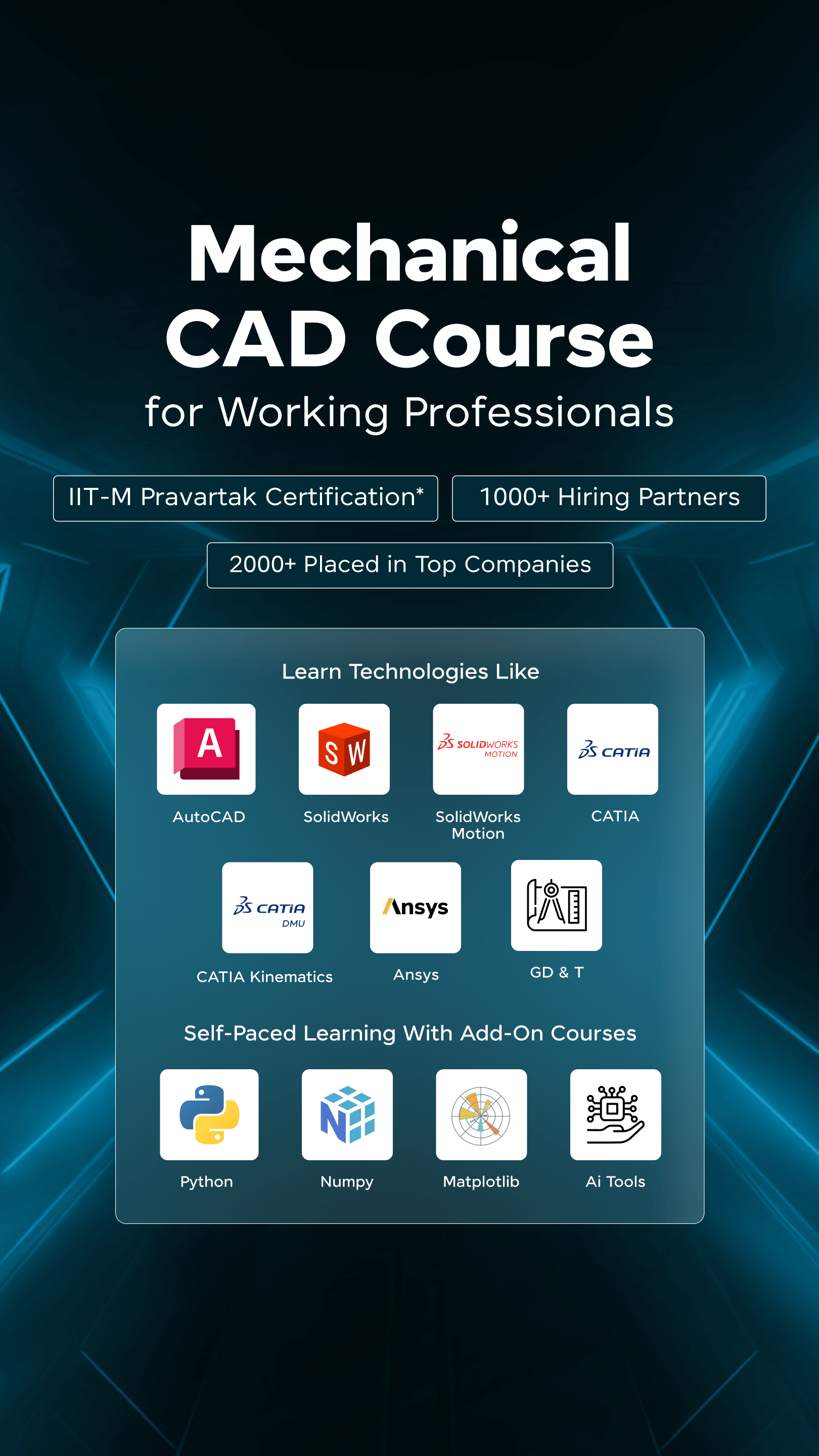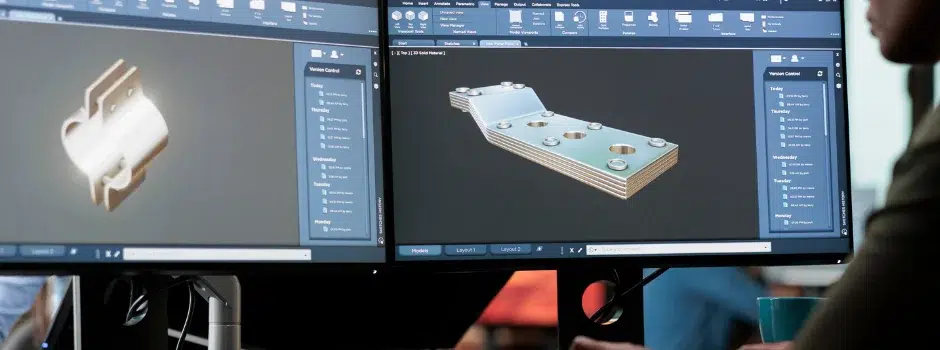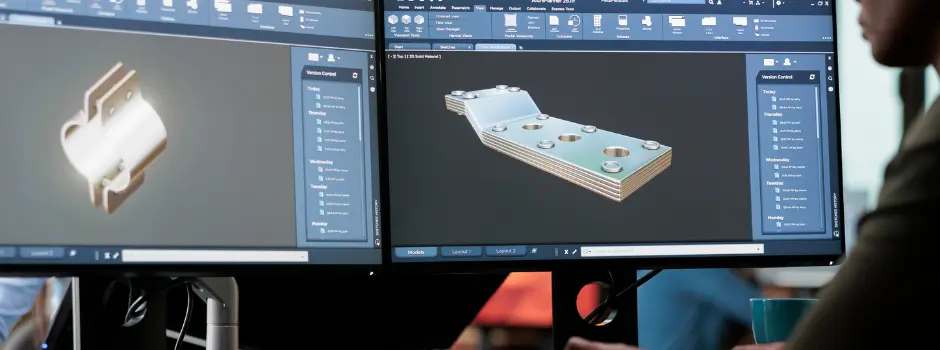
Fundamentals of Mechanical Engineering Syllabus 2025
Mar 21, 2025 6 Min Read 5793 Views
(Last Updated)
Deciding what to pursue after finishing school is a difficult task. It involves a lot of research because the course you will take will decide your future. If you are interested in mechanical engineering, don’t worry; we have you covered as this article explains the mechanical engineering syllabus in-depth.
Almost, 90% of your headache gets over once you understand the syllabus of the course that you want to take, and to make you comfortable, we compiled the mechanical engineering syllabus and this will help you in understanding the subject much better. So, let’s get started.
Table of contents
- What is Mechanical Engineering?
- Mechanical Engineering Syllabus
- Mathematics
- Physics
- Engineering Mechanics
- Thermodynamics and Heat Transfer
- Fluid Mechanics and Fluid Dynamics
- Materials Science and Engineering
- Manufacturing Processes
- Machine Design
- Dynamics and Control
- Mechatronics and Robotics
- Computer-Aided Design (CAD) and Computer-Aided Manufacturing (CAM)
- Conclusion
- FAQ
- What does the Mechanical Engineering syllabus typically cover?
- What skills are required for a successful career in Mechanical Engineering?
- What are the roles of a Mechanical Engineer?
- What are the benefits of learning CAD and CAM in Mechanical Engineering?
- What future trends can we expect in the field of Mechanical Engineering?
What is Mechanical Engineering?

Before we start digging deep into the mechanical engineering syllabus, let’s first understand what mechanical engineering is all about, why it is considered to be one of the pioneering fields in India, and why it is the foundation of every other field.
Mechanical Engineering is a branch of engineering that focuses on the design, analysis, development, and maintenance of mechanical systems.
It involves the application of principles from physics, mathematics, and material science to create, improve, and innovate mechanical systems and devices. Mechanical engineers work with various types of machinery, tools, and systems to solve real-world problems and contribute to a wide range of industries.
Almost every equipment that has been used by other industries has a mechanical structure and that comes from mechanical engineering.
Having stated this, let’s get down to the real deal, that is, exploring the mechanical engineering syllabus.
Mechanical Engineering Syllabus

A mechanical engineering syllabus typically covers subjects such as mathematics, physics, and so on. Apart from this, it also comprises various engineering disciplines that have to be understood in order to become a successful mechanical engineer. So let’s understand them one by one.
1. Mathematics

Honestly speaking, if you are someone who’s weak at maths or who hates maths, I am sorry to say this but mechanical engineering won’t be your forte because one of the core subjects in the mechanical engineering syllabus is mathematics and without it, nothing will work out.
The important concepts of mathematics that are in the mechanical engineering syllabus are:
a) Calculus:
This involves studying functions, limits, derivatives, and integrals. Applications of calculus in solving engineering problems are emphasized more and full focus will be on mathematical engineering as that is an integral part of mechanical subject.
b) Linear Algebra:
Matrices, vectors, determinants, and linear equations come under these and are thoroughly studied. This is important for solving systems of equations and transformations in engineering, You already must have studied about this in your school time but when it comes to mechanical engineering, it is a bit more advanced.
c) Differential Equations:
Different types of differential equations are covered, including first-order, second-order, and systems of differential equations. These are essential for modeling dynamic systems.
d) Probability and Statistics:
Concepts of probability, random variables, distributions, and statistical analysis are taught to analyze uncertainty in engineering systems. This is important to the subject as this only helps you to determine the outcome of a product.
2. Physics

Another subject that’s both interesting and difficult is Physics. As much as it piques our interest, it is equally hard at times but in the mechanical engineering syllabus, physics plays a prominent role in it.
Physics is essential in mechanical engineering as it provides the fundamental principles governing motion, forces, energy, and material behavior.
Engineers rely on physics to analyze and design mechanical systems, understand how materials respond to stress, predict fluid flow patterns, optimize heat transfer, and develop control systems.
Physics underpins the core concepts that enable mechanical engineers to create efficient and innovative solutions for a wide range of industries, from designing vehicles and machinery to developing renewable energy systems and advanced manufacturing processes.
The principles that you have to understand in this subject in the mechanical engineering syllabus are:
a) Mechanics:
Study of forces, motion, equilibrium, and momentum. Concepts like Newton’s laws and kinematics are covered.
b) Thermodynamics:
Understanding energy, heat transfer, work, and the laws of thermodynamics. This is crucial for designing energy-efficient systems.
c) Fluid Mechanics:
Study of fluids’ behavior, including fluid properties, fluid statics, fluid dynamics, and the principles of fluid flow.
d) Heat Transfer:
Exploration of conduction, convection, and radiation mechanisms of heat transfer.
3. Engineering Mechanics
In the mechanical engineering syllabus, engineering mechanics plays a pivotal role as it establishes the groundwork for comprehending how forces and motion interact in various structures and machines.
By employing principles from statistics and dynamics, engineers can assess the stability, stress distribution, and motion of components, ensuring designs are robust and safe.
This knowledge is vital for crafting efficient mechanical systems, from intricate machinery to large-scale structures, and for accurately predicting their behavior under different conditions, thereby facilitating the creation of innovative and reliable engineering solutions.
The things that you will be learning under this subject are:
a) Statics:
Analyzing forces and moments in stationary systems, equilibrium of particles and rigid bodies, and resolving forces.
b) Dynamics:
Understanding motion and its causes, including kinematics and kinetics of particles and rigid bodies.
c) Mechanics of Materials:
Investigating stress, strain, deformation, and material properties. Designing structures to withstand loads.
4. Thermodynamics and Heat Transfer
Thermodynamics and heat transfer are indispensable subjects in the mechanical engineering syllabus as they underpin the efficient utilization of energy and the design of systems that involve heat exchange.
Through these principles, engineers can optimize power generation processes, enhance the performance of engines, and devise effective cooling and heating systems.
This understanding enables the creation of environmentally sustainable technologies, improves energy efficiency, and ensures the durability and safety of mechanical systems by managing thermal stresses and heat distribution, thereby contributing to innovation across industries and advancing modern engineering practices.
Under this discipline, you will be studying the following:
a) Laws of Thermodynamics:
Learning about energy conservation, heat transfer, work, and the properties of working substances.
b) Properties of Pure Substances:
Understanding phase diagrams, equations of state, and properties of gases, liquids, and solids.
c) Heat Transfer:
Delving into conduction (heat transfer through solids), convection (heat transfer through fluids), and radiation (heat transfer through electromagnetic waves).
5. Fluid Mechanics and Fluid Dynamics
Fluid Mechanics and Fluid Dynamics hold critical importance in the domain of mechanical engineering by providing the framework to analyze and design systems involving fluid flow.
These principles enable engineers to optimize the efficiency of pumps, turbines, and pipelines, predict aerodynamic behavior in vehicles and aircraft, and design effective cooling and ventilation systems.
Mastery of fluid mechanics helps in understanding pressure distribution, viscosity, and turbulence, allowing engineers to tackle complex challenges in various industries, from aerospace and automotive engineering to energy production and environmental management, ultimately driving technological advancement and innovation.
Under this subject in the mechanical engineering syllabus, you will understand the following:
a) Fluid Properties and Behavior:
You will be studying fluid density, viscosity, pressure, and temperature.
b) Fluid Statics:
Under this, you have to analyze fluids at rest, including pressure distribution in fluids.
c) Fluid Flow:
Understanding fluid flow principles, Bernoulli’s equation, Reynolds number, and flow measurement techniques.
6. Materials Science and Engineering
Materials Science and Engineering in the mechanical engineering syllabus is significant in mechanical engineering as it equips engineers with the knowledge of material properties, behaviors, and selection, enabling the design and manufacturing of components with desired mechanical, thermal, and electrical characteristics.
This expertise empowers engineers to create structures that withstand specific loads, optimize durability, and enhance performance across diverse applications, from developing lightweight materials for aerospace to designing resilient structures for civil engineering projects, ultimately driving innovation and pushing the boundaries of what is achievable in the field of mechanical engineering.
In this field, you will be studying the following:
a) Material Properties:
Investigating material properties such as mechanical, thermal, and electrical properties.
b) Phase Diagrams:
Understanding the relationships between different phases of materials.
c) Mechanical Properties of Materials:
Learning about stress-strain behavior, hardness, toughness, and fatigue.
7. Manufacturing Processes
In the mechanical engineering syllabus, manufacturing processes have the utmost importance as almost every other job role of the mechanical engineer requires manufacturing knowledge.
Manufacturing processes provide the means to transform raw materials into finished products, encompassing techniques such as machining, casting, welding, and forming.
This knowledge enables engineers to optimize production efficiency, ensure product quality, and control costs by selecting the most suitable manufacturing method for a given application.
Proficiency in manufacturing processes allows innovation in product design and contributes to industries by enabling the creation of intricate components, streamlined production lines, and cutting-edge technologies, ultimately shaping the landscape of modern manufacturing and engineering practices.
a) Machining:
Studying various machining processes like turning, milling, drilling, and grinding.
b) Casting:
Understanding the principles of casting processes to create complex shapes.
c) Welding:
Learning about joining processes involving melting and solidification.
d) Forming Processes:
Exploring techniques like rolling, forging, and extrusion to shape materials.
8. Machine Design
Machine Design holds crucial significance in the mechanical engineering syllabus as it involves the meticulous creation and analysis of mechanical systems and components, ensuring they are safe, efficient, and reliable.
By integrating principles from mechanics, materials science, and manufacturing processes, engineers can develop innovative solutions that meet specific requirements, whether designing complex machinery, precision instruments, or everyday appliances.
Proficiency in machine design allows engineers to optimize performance, minimize failure risks, and contribute to advancements in various industries by creating machines that drive progress, enhance productivity, and improve quality of life.
Important principles that you will be learning in this subject are:
a) Design Principles:
Understanding design methodologies, factors of safety, and design constraints.
b) Stress and Strain Analysis:
Analyzing how materials respond to applied loads.
c) Design of Machine Elements:
Designing components like gears, bearings, shafts, and springs for specific applications.
9. Dynamics and Control
In the mechanical engineering syllabus, Dynamics and Control play an important role in mechanical engineering as they enable the understanding and manipulation of motion and behavior in mechanical systems.
By studying kinematics and dynamics, engineers can analyze the movement of objects and predict their response to forces, leading to improved designs of machinery, vehicles, and structures. Control systems knowledge empowers engineers to regulate and automate processes, enhancing precision and efficiency in various applications.
Proficiency in dynamics and control enables engineers to create sophisticated systems that respond predictably to external influences, advancing technologies across industries and enabling the realization of complex, automated, and intelligent mechanical solutions.
10. Mechatronics and Robotics
Mechatronics and Robotics are two pillars of modern mechanical engineering by integrating mechanical design, electronics, and computer control to create intelligent and automated systems.
This field enables engineers to develop versatile robots that can perform tasks in diverse environments, from manufacturing to healthcare. Mechatronics principles enhance the efficiency and precision of machines by integrating sensors, actuators, and control algorithms, while robotics extends these capabilities to tasks requiring human-like dexterity and adaptability.
Proficiency in mechatronics and robotics empowers engineers to revolutionize industries, offering solutions that enhance productivity, safety, and innovation through the fusion of mechanical and electronic technologies.
In the mechanical engineering syllabus, you will be studying mechatronics and robotics in the following sense:
a) Introduction to Mechatronics:
Understanding mechanical, electronic, and control systems integration.
b) Basics of Robotics:
Exploring robot kinematics, dynamics, and programming.
13. Computer-Aided Design (CAD) and Computer-Aided Manufacturing (CAM)
Computer-Aided Design (CAD) and Computer-Aided Manufacturing (CAM) are essential elements in the field of mechanical engineering, and it is considered to be important in the mechanical engineering syllabus as they revolutionize the design and production processes.
Computer-Aided Design (CAD) software enables engineers to create and simulate complex models in a digital environment, facilitating rapid prototyping, optimization, and collaboration.
Computer-Aided Manufacturing (CAM) takes these designs and translates them into precise manufacturing instructions, streamlining production and ensuring accuracy.
Together, CAD and CAM enhance design efficiency, reduce time-to-market, and enable the creation of intricate, customized products, driving innovation in industries by seamlessly connecting conceptualization to realization and shaping the way mechanical systems are conceived, refined, and brought to life.
Conclusion
In conclusion, the mechanical engineering syllabus serves as the foundation for you to understand the subjects that you will be learning throughout your course duration. It is but limited to various institutions and these are some of the common subjects that they teach.
As the field continues to advance and diversify, the mechanical engineering syllabus remains a dynamic roadmap, guiding students like you toward shaping the future through groundbreaking discoveries, sustainable solutions, and transformative technologies that will shape industries, improve lives, and help people around the globe.
FAQ
The Mechanical Engineering syllabus covers subjects like mathematics, physics, thermodynamics, fluid mechanics, materials science, manufacturing processes, machine design, dynamics, control systems, and more.
Essential skills include problem-solving, critical thinking, strong mathematical and analytical abilities, proficiency in CAD/CAM software, teamwork, communication skills, and adaptability to evolving technologies.
Mechanical Engineers can work in various roles such as design engineer, manufacturing engineer, quality control engineer, research and development engineer, project manager, and even in specialized areas like robotics, automotive, aerospace, energy systems, etc.
CAD (Computer-Aided Design) enables engineers to create and simulate 3D models, while CAM (Computer-Aided Manufacturing) translates designs into manufacturing instructions, speeding up production and enhancing precision.
Future trends include advancements in automation, robotics, additive manufacturing (3D printing), renewable energy technologies, sustainable design practices, and increased integration of digital tools in engineering processes.




























Sir.... it's brilliant.....And very helpfull.... Mechanical Students...Heartly Thanks 🙏 sir